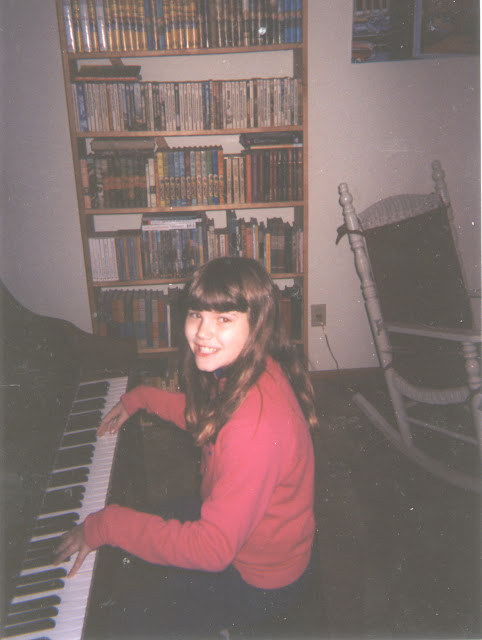 |
Me, learning how to get through a piano lesson without crying in frustration.
I've always hated not being instantly good at things. What a perfect segue into this post... |
Imagine that you walk into a room with a piano, and a small child is seated on the bench, playing scales. It's clear that this child has just started lessons, because she is fumbling through the patterns, trying to get her fingers to cooperate. Still, she is playing, and working hard at it. She notices you standing there and stops, blushing.
Do you say…
A) "You're learning piano— that's awesome!"
A) "You're learning piano— that's awesome!"
B) "Geez, some pianist you are— you can't even play a Beethoven sonata!"
If you answered A), that's my favorite answer. If you answered B), you're either delightfully sarcastic or a terrible human being.
Nobody gets upset at a beginning piano student for playing only scales.
But a lot of us get impatient with ourselves for doing the equivalent of scales when we start to learn a new skill.
For instance, since I posted the first of my “Greener Year Challenge” series last week, I’ve been encouraged to have a few people reach out to me and promise to take steps toward being more eco-friendly. A common thread in these interactions, though, is an almost embarrassed attitude: “I know it’s not much, but I’m going to try this thing," or, "I'm taking this step, but it's a baby step."
I think everyone, especially me, needs this reminder:
Baby steps are good.
Baby steps are crucial.
As adults, we're used to doing things that we're already good at; we've already done the "scales," so to speak, which support a wealth of habits and skills that we can readily pick up. But when we try someone truly new to us, we don't have the groundwork that makes it easy to learn. We get frustrated with the timeline and upset at ourselves.
But math begins with addition, not algebra. Drawings begin with shapes, not the Mona Lisa. Gardening begins with keeping alive a couple of plants, not planting a subsistence farm.
Scales don't sound very impressive, and they can be tedious to practice, but you have to master them if you want to play a Beethoven sonata.
If you practice long enough, you'll get comfortable with scales, and you can add another skill on top of that. And when you've mastered that skill, another one. Eventually you'll learn to play a sonata, but even then you're not done: there are always new songs to play, new techniques to hone, new skills to build. It's an ongoing process. That's how you learn to play the piano, or draw, or cook, or rebuild a car engine: one baby step at a time.
When we grow frustrated with ourselves, we need to imagine that we are that child at the piano, doing her best. Yes, someone with a year of piano lessons would play the scales better. But that child hasn't been playing for a year, so you can give her some grace. (And if she's still not playing well after a year, you can gently ask yourself if there's another approach that could help her out, or if she should decide to quit the piano and take up ballet.) Please, don't berate this child inside you for taking baby steps. She is brave, because learning something from scratch is really hard.
So if you choose to take any of the Greener Challenges— or any other new skill or habit you want to learn— don’t try to tackle too much. Pick one thing. Focus on making it a habit. Explore it. Have fun with it. Fumble through some scales, and don’t worry about the sonatas for now. The important thing is that you start.
~~~

No comments:
Post a Comment